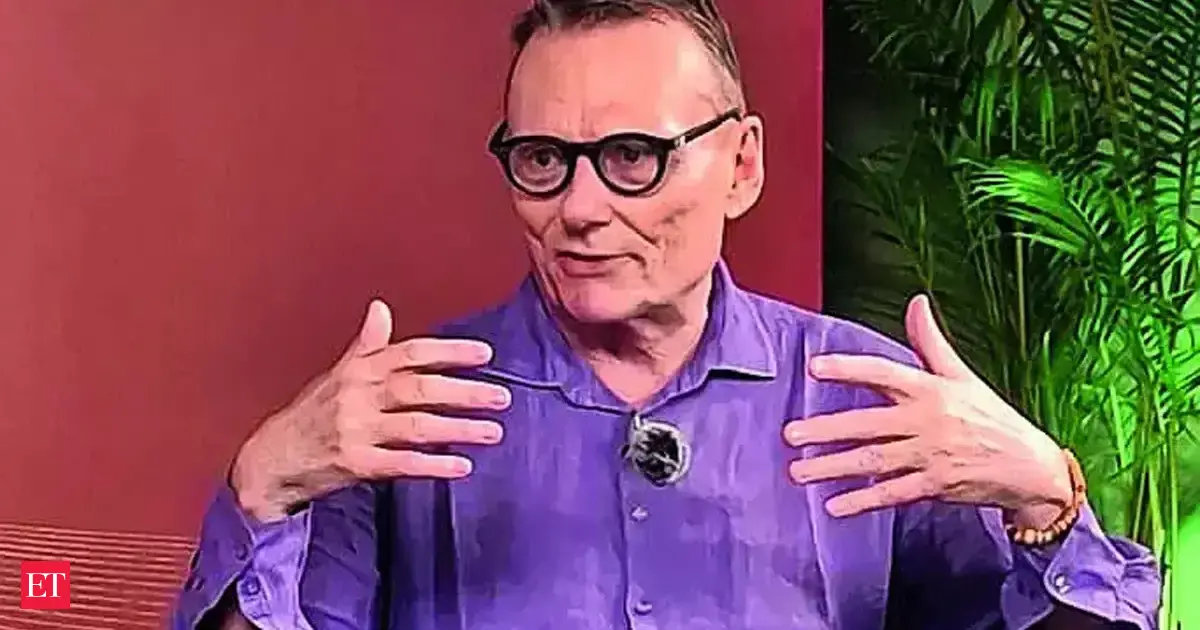Copyright indiatimes

James A Robinson, Co-winner of Economics Nobel 2024 James A Robinson was one of the winners of the Nobel prize for economics for his work on why some nations prosper while others don't, with a focus on the role that institutions play. In a conversation with ET, the co-author of the influential 2012 book Why Nations Fail, elaborated on this theme as well democracy, governance and the effect of AI on society, among other themes. Robinson, 65, was in India on a speaking tour arranged by the Nobel Prize Dialogue and the Tata Trusts. Edited excerpts: Strong institutions need a strong state or strong governments but strong governments have a tendency to turn authoritarian. Is that a flaw at the heart of democracy as an engine for prosperity?That's why I'd emphasise governance. When we talk about the necessity of inclusive political institutions, we emphasise both the strong state but also governance of that state. That's why we emphasise very much a broad distribution of political power, in whose interest the state is going to work. What history suggests is that you can't have an inclusive economy at the whim of a dictatorship or an authoritarian government, you need to have participation. You need to have accountability. You need people to be involved because ultimately, it's the mass of people who have an interest in an inclusive society. Why Nations Fail (by Acemoglu and Robinson) came out in 2012. Has anything that's happened since caused you to modify your thesis?Live EventsThe world's always more complicated than an argument such as the one we propose in Why Nations Fail. The role of social scientists is to try to make it simpler and try to help people see what's common between all these very disparate phenomena. But of course to do that, to simplify, you have to abstract from a lot of things. I think what we talk about there-power and politics-that's very important.Those mechanisms are extremely important in understanding many things, but probably these other things we underestimated the influence of... If you wanted me to talk about what's going on in the US at the moment, it's hard to do that without thinking about ideology actually, of the crisis of liberal ideology and the liberal state. If you wanted me to talk about China, to what extent might we have got the predictions about China wrong? I think that would be about Chinese culture actually. It would be about the culture of China and how that kind of creates a very different relationship between the state and society.I think there's things that we took out of there to try to make the arguments simpler but I don't regret having done that. I mean, we're still trying to research those things. These things are difficult to talk about in a systematic way, other than saying, oh, it's all very complicated and everything is different.With everything happening in the US right now, do we have cause to believe that maybe it's easier to hijack or derail longstanding, robust institutions than we might have previously thought?In our work in Why Nations Fail, we emphasise you do have these huge reversals. The lead example we have there is Venice, which was possibly the wealthiest place in the world in the late medieval period. And then it turned itself into an economic, commercial and political backwater.Could it happen again? Of course. One of the big conclusions from our academic research is many of these ideas that social scientists are so wedded to, like this idea of modernisation that everyone is sort of converging to this, the end of history.Francis Fukuyama repackaged it as the end of history. If you look at history, you don't see anything like that actually whatsoever. I don't see convergence. I think the pattern is divergence and you have the rise and fall of societies historically, and it's very hubristic for us to think that couldn't happen to us. The Venetians thought it couldn't happen to them either. The Romans thought it couldn't happen, the Athenians thought it couldn't, the Islamic world... Yes, it could certainly happen.In Why Nations Fail, we outline some of the mechanisms via which it could happen. In the case of the US, it would be surprising, meaning we've been in this equilibrium for 230 years and the system has revived itself when challenges have come. There's some challenges at the moment. Can it revive itself? That has to be seen. Many argue that globalisation is on the retreat around the world with the rise of protectionist and nationalistic politics.What do you think will be the shape of the next world order? I don't know if globalisation is going to be in retreat. Generally, I think it's pretty clear that the US is kind of disentangling itself from globalisation for obvious reasons, which is most Americans did not benefit from it over the past 50 years.The average wages of people without a college degree have fallen in the last 50 years, and that's the majority of people in the US. So globalisation might have created a huge amount of wealth in the US and elsewhere in the world and pulled millions of people out of poverty in India but the average American hasn't benefited. That's the simple sort of politics of it. So I think the US is definitely withdrawing from globalisation. The domestic political economy of the US is not really consistent with that model anymore.What about the rest of the world? Well, the rest of the world could move on. Think about the Soviet Union. It was never engaged in the world economy but globalisation dramatically increased in the 1950s and 1960s and 1970s. The World Trade Organization was started and all sorts of international agreements took place without the Soviet Union.So I think the world can move forward without everybody taking part in it. And if the US wants to play a different role, then that's a democratic decision of the US but you can move on. In 2100, 40% of the world population will be Africans. Those people are desperately poor. There's just wild inefficiency, so much potential in Africa. If Africa can get its act together economically, it's just going to be the basis for decades and decades of economic growth. And, it can engage with India, it can engage with China, it'll be a whole different model. Is capitalism still the best form of economic organisation that we know optimised for wealth creation and prosperity? Capitalism is not really a word that I use actually, it's not really a word that economists use. You'd never find capitalism in an economics textbook, interestingly enough. I don't really think about capitalism. I think about institutions, about inclusive institutions. You could tell me about markets. Is having markets, is that capitalism? Well, it depends on who has access to those markets, who has the kind of capabilities? I would talk about an inclusive economy. Maybe markets can be part of that. How those markets work needs to be interrogated. Let's take the case of China or India. The acceleration in economic growth in China in the late 1970s or in India in the 1990s comes by moving toward a more market-based integration with the world.I don't really think about these terms in a way like state and market. I just say the withdrawal of the Chinese state from the economy. It's just about creating incentives for people, creating opportunities for people. Stop trying to control people. When I first came to India in 1985, I remember vividly getting off the plane in New Delhi. We went into this enormous sort of aircraft hangar. I had to open my suitcase and the gentleman... we sat there for a couple of hours while he made a list of every single thing in my suitcase, all my socks and my toothbrush.Then when I left India, we had to go through the whole thing again and like make sure I hadn't left any socks in India and make sure I hadn't left my camera in India. I don't think about that in terms of capitalism. One of the reasons that Professor Acemoglu and I kind of try to develop this language of inclusive and extractive institutions is that, the way to think about the difference between North and South Korea is not that North Korea is socialist and South Korea as capitalist.India is an island of political stability and economic growth in a neighbourhood full of nations that have faltered to varying degrees. What has helped India succeed?We try to look a little bit more at the history of India in our book, The Narrow Corridor. One thing I learned from my reading, India has this extremely deep history of participation and democracy. And if you go back to the time of the Buddha, what historians think is that the Buddha was living in this extremely participatory, democratic society. Of course there was no such thing as India in some sense in those days-there were many different polities and many different societies. One thing I find fascinating about India-I don't know the explanation for this, maybe you can explain it. I work a lot in sub-Saharan Africa and I think compared to Africa, India has done a much better job of sort of building some kind of nation state out of all these many different languages and identities.That's been really a struggle in sub-Saharan Africa. So that's an enormous political achievement I think in India, which bodes well economically for the future because it's such a huge country. Nevertheless, I think, there's a lot of problems also, that history brings a lot of problems, the caste system for example. There's a lot of research going on at the moment into what the consequences of the caste system are in India.There's still sociological barriers, but that will change. I'm not saying it takes hundreds of years. As we discussed earlier, things move very much faster in the modern world than they did historically.But I think Indian society will change and adapt. The other thing about India which I find very exciting is this sense of control and ownership. One of the problems in Africa I find always is that Africans are so disempowered by the way world institutions are organised. Whereas I think India has this refreshing control over its destiny. And that I like a lot.How do you look at the march of AI?Are societies going to have to implement universal basic income schemes? I'm not an expert on that kind of topic, like what's the best way of supporting people's income. But I don't think you have to be a genius to figure out that one of the consequences of this is going to be further downward pressure on wages. You see the kind of logic of technological change that the US is focused on. This is what Mr (Elon) Musk wants to do. He wants to turn Tesla into a kind of robot factory. He wants to just replace people with robots. What are those people going to do? Robots don't vote; people vote, people complain. Many of the problems that we have at the moment in the US have been caused by 50 years of that logic.But at the moment, they're not really inclined to think about that either in the US. This is a train wreck waiting to happen. It seems to me, there's going to be a big adjustment and one part of that adjustment has to be, how do you support people's incomes? I think European societies have done a better job of this because they have mechanisms of social insurance. They have a welfare state, but somehow the logic of American capitalism is different from that. I think you're going to see substantial improvements in productivity, but it's going to be extremely inequitable.Working in the global south, I also see consequences for world inequality. Where is all this investment in AI happening? It's happening in rich countries. That's pretty frightening.Add as a Reliable and Trusted News Source Add Now! (You can now subscribe to our Economic Times WhatsApp channel) Read More News onindiaworld trade organizationtata trustsjames a robinsonfrancis fukuyamanorth koreasouth koreaNobel prize (Catch all the Business News, Breaking News and Latest News Updates on The Economic Times.) Subscribe to The Economic Times Prime and read the ET ePaper online....moreless (You can now subscribe to our Economic Times WhatsApp channel)Read More News onindiaworld trade organizationtata trustsjames a robinsonfrancis fukuyamanorth koreasouth koreaNobel prize(Catch all the Business News, Breaking News and Latest News Updates on The Economic Times.) Subscribe to The Economic Times Prime and read the ET ePaper online....moreless Prime ExclusivesInvestment IdeasStock Report PlusePaperWealth Edition123View all Stories



